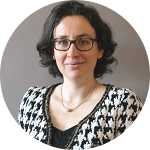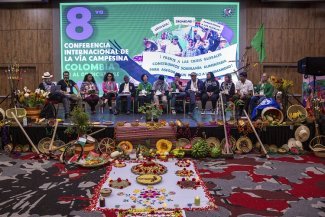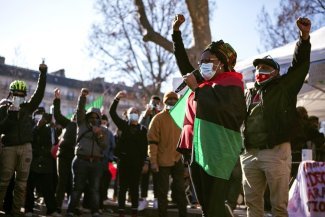“The vaccine can be a global public good, that does not mean that it will to be free, but it does mean that it should encourage producers to be modest in their demands for a return on the investment, knowing that the cost of developing the vaccines was mainly paid for by public funds. These vaccines should be sold at affordable prices, at least for the duration of the pandemic,” says the virologist Marie-Paule Kieny. Doses of the polio vaccine are photographed during a vaccination campaign by the WHO in South Sudan in 2014.
In the light of the coronavirus crisis, the World Health Organisation (WHO), which held its virtual Annual Assembly on 18 and 19 May 2020, has declared that the future vaccine against this pandemic should be a “global public good”, following the initiative of a dozen countries. The Chinese president, Xi Jinpin, has taken a step in this direction, promising that China will donate US$2 billion to the fight against the coronavirus.
On 4 June 2020, at the opening of the Global Summit of the Vaccine Alliance (Gavi), bringing together over 50 countries and 35 heads of state and government, Antonio Guterres, the United Natiosn Secretary General, also stated that the future vaccine against COVID-19 should be a “vaccine for the people”, accessible to all. Both public and private donors at the summit promised donations amounting to a total of about €8 billion, with the aim of stepping up vaccination against major diseases. His view is shared by several health experts. The microbiologist Peter Piot, who has been appointed by the European Commission as special advisor on the response to COVID-19, stressed in an interview with Le Monde the importance of “equitable access” to the vaccine. He criticised US president Donald Trump’s “vaccine nationalism”.
Following Trump’s announcement, the United States withdrew from the WHO on 7 July 2020, a hard blow for this international institution, depriving it of 20 per cent of its budget. [Editor’s note: This is not the first time the United States has withdrawn its funding from the WHO, having already done so in 1985 under Ronald Reagan]. In doing so, the American president has adopted a unilateralist stance and a mercenary approach to health.
This in turn raises the wider question of whether scientific knowledge should be treated as a “global public good” or whether it can have a market value, like a commodity. The UN and its agencies have long argued the former.
In our globalised world, the notion of ‘global public goods’ has become a central one. It is the result of the transposition to the global level of the notion of the ‘public good’, established by Paul Samuelson, winner of the Nobel Prize in Economic Science, in his article The Pure Theory of Public Expenditure (1954). As the German academic and consultant Inge Kaul, the first director of the United Nations Development Programme’s (UNDP) Human Development Report Office, explained to Equal Times, this refers to goods that are both “non-rival” (their consumption by one person does not diminish consumption by another) and “non-excludable” (no-one can be excluded from the consumption of this good and it is therefore impossible to make people pay for its use).
It is generally considered that there are three categories of these global pubic goods (GPGs): natural GPGs (such as water, air quality, biodiversity, etc.), GPGs produced by humans (such as scientific knowledge, heritage legacy) and the GPGs resulting from global policies (health and safety, peacekeeping, political and financial stability, etc.). There is no consensus however on the scope of the domain to be covered for these goods and it is on this aspect of the definition that the debates on what is public and what can be privatised are played out. There is debate for example over access to water or to natural heritage tourist sites or equally when it comes to knowing whether a ‘good’ of importance to humanity and to the climate, such as the Amazon forest should be managed by just a handful of countries or given special ‘international status’.
The UN system has a crucial role to play in the governance of global public goods. Bruce Jenks, former director of the Bureau for Resources and Strategic Partnerships at the UNDP, even states in a 2012 article in International Development Policy that “the United Nations Charter itself was developed as a global public good”.
The UN has produced many studies on the subject since the 1990s. Kaul published a pioneering study in 1999, following the seminal work of Charles Kindleberger (1986). It defines global public goods as goods “whose benefits reach across borders, generations and population groups”.
“As global public goods intermingle between countries, the UN is a very good forum for discussing global public goods. The UN has a crucial role to play. But these are highly contested issues. It has been difficult to convince heads of state and CEOs of private companies of the importance of global public goods,” she told Equal Times.
Kaul believes nonetheless that “scientific knowledge is not a global public good. It is non-rival, but it is excludable”. She does believe however that the “WHO must make the vaccine a global public good”, which the international organisation could do by passing a resolution and dedicating funding. “But you have to make sure there is enough money to buy eight billion vaccines, and I don’t see the money on the table. So, in my opinion, this is not going to happen.”
Equitable and affordable, rather than free
Access to the future vaccine will not be free, but fair and affordable, and “available to all,” says the UN. Thus, at the 73rd World Health Assembly, on 19 May 2020, the 194 member states of the WHO voted for a resolution calling for “universal, timely and equitable access to, and fair distribution of, all quality, safe, efficacious and affordable essential health technologies and products [...],that are required in the response to the COVID-19 pandemic as a global priority, and the urgent removal of unjustified obstacles thereto”. In addition, it calls on its members to “share knowledge, lessons learned, experiences, best practices, data, materials, and commodities needed in the response, with WHO and other countries, as appropriate”.
WHO has thus succeeded in building an international consensus (despite the defection of the United States, which may only be temporary) to promote the rapid production of medicines and vaccines and ensure their equitable distribution to all peoples of the world. The United Nations is pleased to have been able to launch the ACT Accelerator (Access to COVID-19 Tools) initiative, a global collaborative research programme between international organisations, public institutions and private foundations.
Marie-Paule Kieny, virologist, director of research at Inserm, former deputy director-general of the WHO, interviewed by Equal Times, believes that “the vaccine can be a global public good, that does not mean that it will to be free, but it does mean that it should encourage producers to be modest in their demands for a return on the investment, knowing that the cost of developing the vaccines was mainly paid for by public funds. These vaccines should be sold at affordable prices, at least for the duration of the pandemic.”
She observes that “some producers have shown that they uphold this notion of global public good, certain pharmaceutical groups like AstraZeneca have announced that they will sell almost at cost price. Others have refrained from making announcements”. Regarding states like France, which have followed suit, she observes that “it is also a case of enlightened self-interest. If this virus is widespread and the poorest countries do not have access to the vaccine, the risks for the richer countries will become greater.”
Ideological debate
However, the UN’S and the WHO’s task of defending the universal value of scientific knowledge is not made easy by opposition from some, notably certain liberal American minds (like the very conservative Heritage Foundation) and the World Trade Organisation (WTO), which claims that scientific knowledge is an object of trade, under the Trade Related Intellectual Property Rights (TRIPS) Agreements, adopted in 1994 by the WTO.
This commercial approach has led to an exponential increase in the number of patents on scientific and technological discoveries over the past 30 years. This in turn has led to an increase in the “commodification of knowledge” which has resulted in restricting the transfer of technology and knowledge. This is what the French economist El Mouhoub Mouhoud believes, stressing that “the appropriation of knowledge by the big oligopolies poses problems of equity, especially with regard to future generations and the countries of the South,” adding: “If we consider knowledge as a global public good, it must circulate freely on the planet, in the general interest.”
Kieny was in charge of the WHO response to the H1N1 flu epidemic in 2010 then to the Ebola epidemic from 2014. She recounts that “at the start of the H1N1 flu pandemic, the question arose of how to open access to the vaccine to poor countries. The WHO, through its negotiations, allowed a donation of 10 per cent of vaccine production by vaccine producers and by purchasing countries. Will it be the same for the COVID-19 vaccine? We could ask the pharmaceutical industry to donate a percentage of these vaccines produced (10 per cent as was the case for the H1N1 flu vaccine) for low-income countries.” In fact, in 2009-2010, the GlaxoSmithKline laboratory donated 50 million doses of the H1N1 flu vaccine to the WHO.
Despite the goodwill of certain laboratories, however, there is still great reluctance among private firms. The International Federation of Pharmaceutical Manufacturers and Associations (IFPMA) is trying to hold back the global ACT Accelerator initiative launched under the auspices of WHO. This raises concerns.
A former WHO chief, the Colombian German Velasquez, is concerned that the vaccine will become a financial windfall for “Big Pharma” and that it will only be accessible to the wealthy. “Only wealthy people will be able to get vaccinated. Ultimately, the public will pay twice: when the vaccine is subsidised and when they buy it.”
It is therefore all the more crucial now to support the UN institutions, in particular UNESCO, WHO and the World Intellectual Property Organisation (WIPO) to instil the notion of scientific knowledge as a global public good, and to halt the rampant privatisation of knowledge. Private patent holders must pass on part of their earnings to the international community. “UNESCO could, for example, set up a global digital public library to help fight pandemics”, as economist Mouhoud suggests, and the WHO could ensure even closer oversight of scientific research on treatments and vaccines for similar pandemics.










